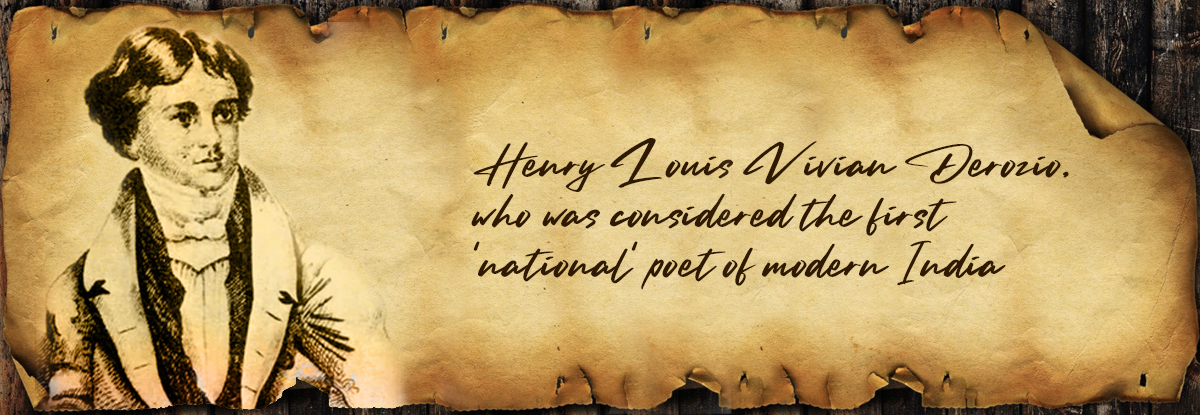HENRY LOUIS VIVIAN DEROZIO
HENRY LOUIS VIVIAN DEROZIO WAS A FIERY INDIAN TEACHER AND POET. AS A LECTURER AT THE HINDU COLLEGE IN KOLKATA, HE GALVANISED A LARGE GROUP OF STUDENTS TO THINK INDEPENDENTLY. AND LATER, THIS YOUNG BENGAL GROUP PLAYED A KEY ROLE IN THE RENAISSANCE MOVEMENT
Derozio was considered the first “national” poet of modern India and his poems are regarded as an important landmark in the history of patriotic poetry in India, especially To India – My Native Land and The Fakeer of Jungheera.
Born at Entally, Padmapukur, on April 18, 1809, Derozio was an Anglo-Indian of mixed Portuguese descent. But he was fired by a patriotic spirit for India and his native Bengal. He attended David Drummondʼs Dhurramtallah Academy, where he was a star pupil, reading widely on topics as varied as the French revolution and the poetry of Robert Burns. He quit school at the age of 14 and initially joined his fatherʼs concern and later shifted to Bhagalpur.
Inspired by the beauty of the banks of the Ganga, he began writing poetry, which he sent in to the India Gazette. In 1825, his career as a poet began to flourish with poems being published in several newspapers and periodicals. In 1827, when Derozio was 18, Dr John Grant, the editor of the India Gazette, invited him to return to Calcutta and offered to publish a book of his poetry. Soon he became an assistant editor to Grant, and went on to found his own newspaper, the Calcutta Gazette.
Earlier, in 1826, at the age of 17, Derozio was appointed as a teacher of English Literature and History at Hindu College in Kolkata, where he helped to release the ideas for social change already in the air. His brilliant lectures presented closely reasoned arguments based on his wide reading. Although Derozio himself was an atheist and had renounced Christianity, he encouraged questioning the orthodox Hindu customs and conventions.
His intense zeal for teaching and his interactions with students created a sensation. He motivated them to form a literary and debating club called the Academic Association. In 1830, this club brought out a magazine named Parthenon where articles criticised Hindu practices, British imperialism and upheld womenʼs emancipation.
Many of his students eventually rebelled against Hindu orthodoxy, and joined the Brahmo Samaj, while some converted to Christianity. Due to his unorthodox views, the Hindu-dominated management committee of the college expelled him as a faculty member. Though faced with penury, Derozio continued his interaction with his students. Unfortunately a fatal bout of cholera claimed him in 1831 when he was just 22 years old. His body was buried in South Park Street Cemetery. A commemorative postage stamp of Derozio was issued on December 15, 2009.

